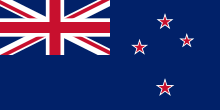New Zealand
island country in the southwest Pacific Ocean
(Redirected from Christchurch)
New Zealand is a sovereign island country in the southwestern Pacific Ocean. The country geographically comprises two main landmasses—the North Island (Te Ika-a-Māui), and the South Island (Te Waipounamu)—and around 600 smaller islands. New Zealand is situated some 1,500 kilometres (900 mi) east of Australia across the Tasman Sea and roughly 1,000 kilometres (600 mi) south of the Pacific island areas of New Caledonia, Fiji, and Tonga. Its current head of state is Charles III, and its current head of government is Prime Minister Christopher Luxon.

| This geography-related article is a stub. You can help out with Wikiquote by expanding it! |
Quotes
edit- After its great bust in the 1880s, New Zealand ceased to see itself as an embryonic replica of Britain, an 'Infant Hercules', and accepted a more modest role as an exemplary paradise, 'the world's social laboratory', a title also claimed by South Australia.
- James Belich, Replenishing the Earth: The Settler Revolution and the Rise of the Anglo-World, 1783-1939 (2009)
- The first thing you notice about Mumbai is the first thing you notice about every place the British once occupied, which is how much of themselves they left there. The United States spent over a decade and trillions of dollars in Iraq, and the only physical evidence that remains is a concrete embassy compound, some airstrips, and a sea of steel shipping containers. Maybe because they never considered that they might leave, the British built entire cities out of stone, with railways to connect them. And they did it with reliably good taste. Too often lost in the hand-wringing over the evils of colonialism is the aesthetic contribution of the British Empire. The Brits tended to colonize beautiful places and make them prettier. Bermuda, New Zealand, Fiji, Cape Town—notice a theme? Style wasn’t an ancillary benefit; it was part of the point. Behind every Gurkha regiment marched a battalion of interior designers.
- Tucker Carlson, “Tucker Carlson's Diary: The Aesthetic Merits of British Colonialism" Spectator, March 3, 2016
- I think every person, when he or she is young, dreams of finding some enchanted place, of beautiful mountains and breathtaking coastline and clear lakes and amazing wildlife, and most people give up on it because they never get to New Zealand.
- I believe we were all glad to leave New Zealand. It is not a pleasant place. Amongst the natives there is absent that charming simplicity which is found at Tahiti; and the greater part of the English are the very refuse of society. Neither is the country itself attractive.
- Before the Polynesians first set foot here in the thirteenth century, at least eleven species of moa lived here. Moa were enormous ratites, sometimes weighng up to 440 pounds and growing 9 feet tall. Furthermore, the island was inhabited by dozens of other unique bird species, including an eagle with a wingspan of almost 9 feet that hunted moas. Within a few centuries, the moas, and consequently also the eagle, all went extinct.
- Arjan Dwarshuis, The (Big) Year That Flew By (2023), ISBN 978-1-64502-191-9, pp. 70-71
- In some ways I believe I epitomise the average New Zealander: I have modest abilities, I combine these with a good deal of determination, and I rather like to succeed.
- To illustrate how dramatically populations can displace each other over time, the historian E.M. Kulischer once reminded his readers that in A.D. 900 Berlin had no Germans, Moscow had no Russians, Budapest had no Hungarians, Madrid was a Moorish settlement, and Constantinople had hardly any Turks. He added that the Normans had not yet settled in Great Britain and before the sixteenth century there were no Europeans living in North or South America, Australia, New Zealand, or South Africa.
- Neil Howe, Richard Jackson (2008) The Graying of the Great Powers: Demography and Geopolitics in the 21st Century. p. 15
- The history of this country still shows itself in the power imbalances between ourselves and the Crown, which is contrary to Te Tiriti o Waitangi.
- By the time of the First World War, the descendants of the British who had settled in Australia, Canada or New Zealand were held to be tougher and more brutal than their cousins in Britain, thanks to their geography. When the ‘less civilised’ and therefore the less adept at war won victories, these had to be written off as mistakes. When a Maori force defeated a British one in the wars in New Zealand in the mid-nineteenth century, The Times of London was quick with an explanation: ‘just as at chess a bad and reckless player is sometimes more formidable than a master of the game’.
- Margaret MacMillan, War: How Conflict Shaped Us (2020)
- New Zealand was colonised initially by those Australians who had the initiative to escape.
- Robert Muldoon, My Way (1981)